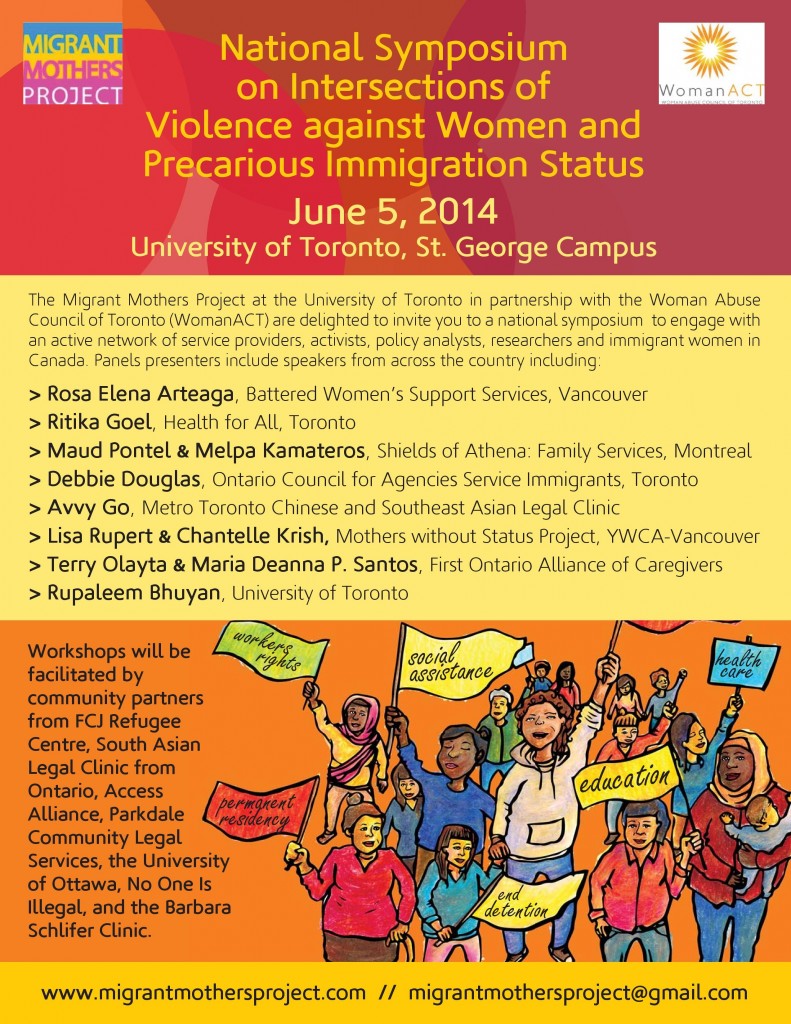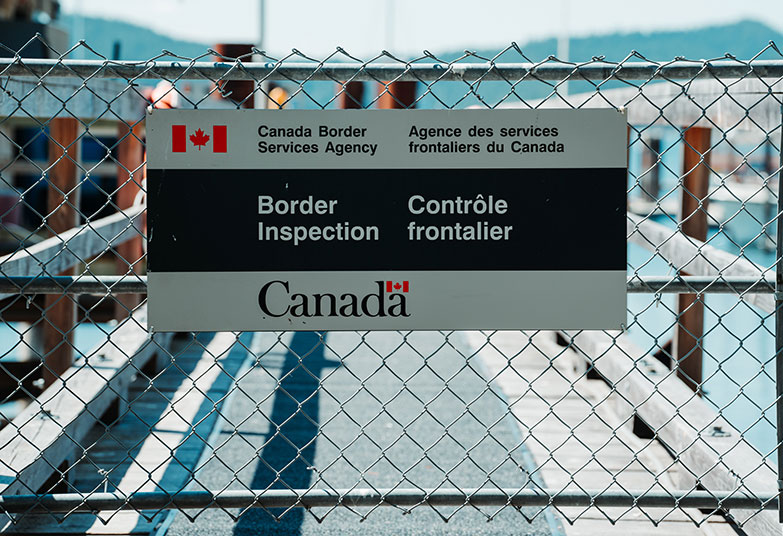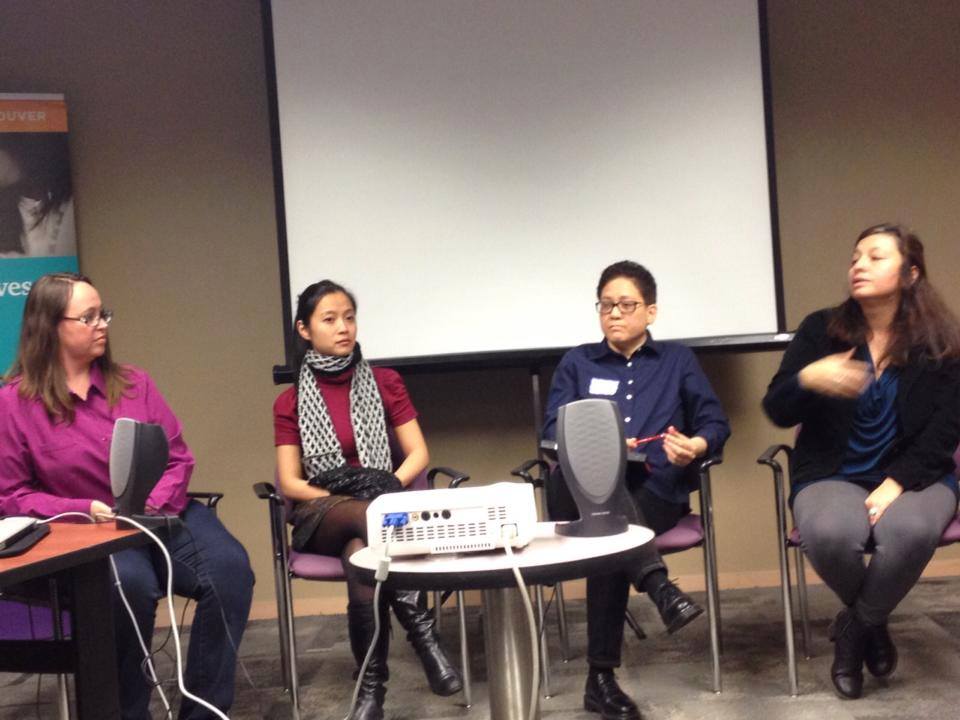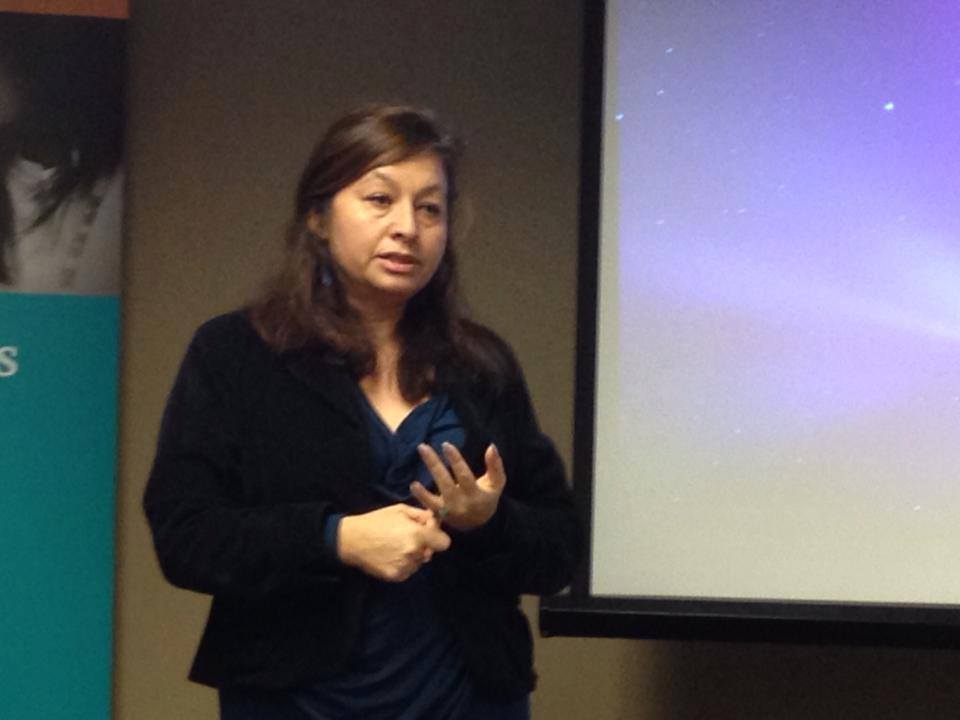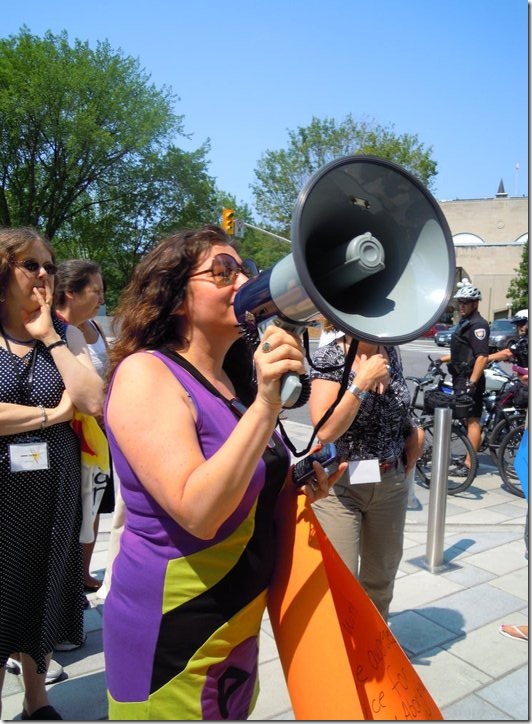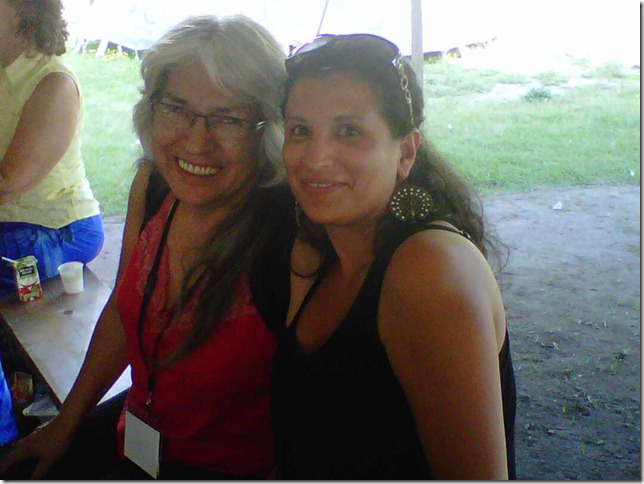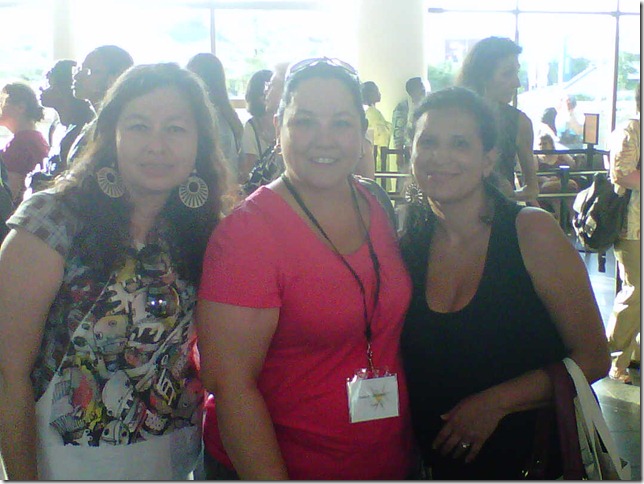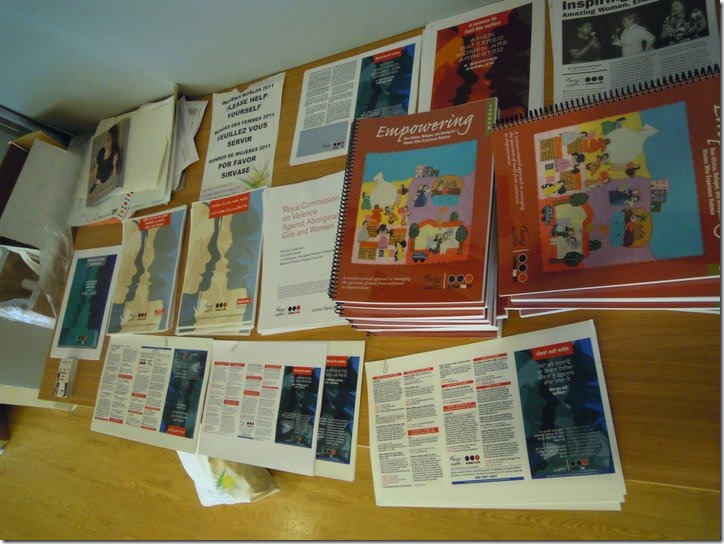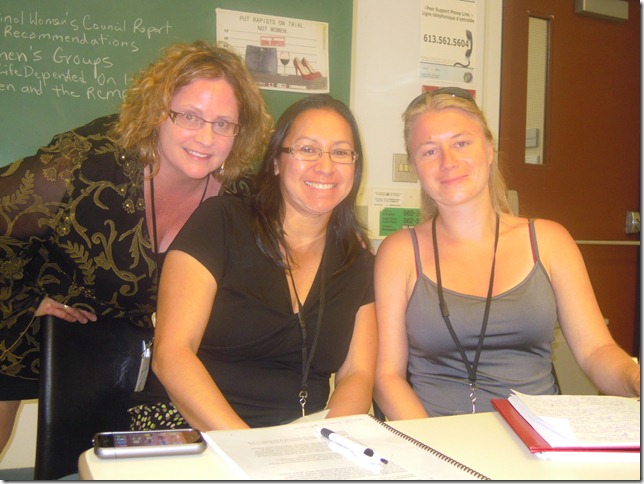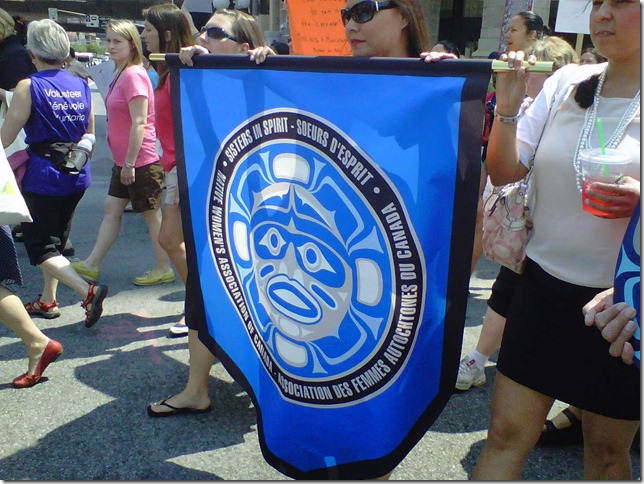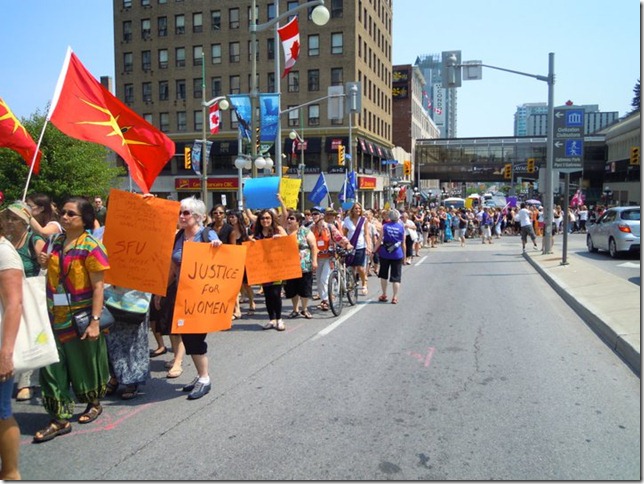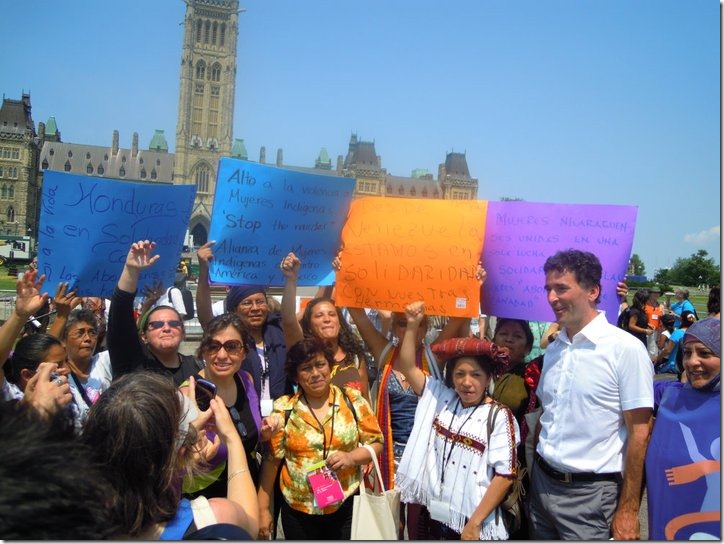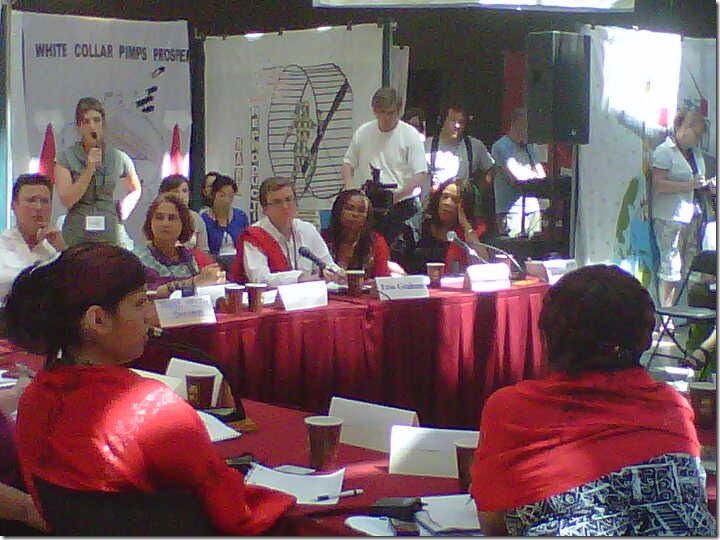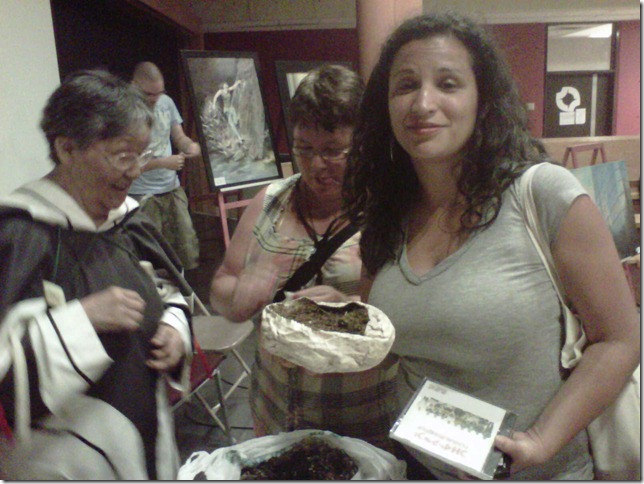It is virtually impossible for a Mexican woman to escape from violence and to make it into Canada, a country known to offer protection to people who are being persecuted, including those who experience gendered persecution. We have learned of several migrant Mexican women who have been deported and murdered in Mexico upon their return. A number of Mexican women who seek refuge in Canada have been rejected because according to the Immigration and Refugee Board (IRB), “Mexico has a system of functioning democratic institutions”. Nevertheless, according to a UN report Mexico was ranked first globally in sexual violence against women, reporting 120, 000 violations in 2010. The Ministry of Health estimates that in Mexico one woman every four minutes is raped, yet to date there is no comprehensive care for the victims, because there is no effective follow-up cases. In Ciudad Juarez, Mexico, since 1990 women continue to be murdered and go missing. 2012 was one of the years with the highest femicides in that city.
According to the United Nations Office for Drug Control and Crime Prevention (UNODC) and the Trafficking in Persons Report of the Department of State United States of America, Mexico is listed as a source, transit, and destination for trafficking in persons. Just in the state of Mexico, between 2005 and 2010, 89% of femicide cases have been unresolved. As violence against women continues in Mexico, whether because of the war on drugs or gendered violence, the country has been desensitized regarding violence and has forgotten about protecting its own citizens.
In response to The Balanced Refugee Reform Act (Bill C-11) in 2011, Battered Women’s Support Services published an article on Gender Persecution and Law Reform in Canada. At the time we expressed our concerns about the possible consequences of these reforms on women whose fear of persecution relates to their gender. Many of the comments about the possible consequences for women refugee claimants would also apply to refugee claimants, generally, who are severely traumatized and vulnerable. We exposed that instead of making it easier for the most vulnerable claimants to present their stories, in our view, the amendments to Immigration and Refugee Protection Act (IRPA) under Bill C-11 and the proposed regulations would make it much more likely that the full facts of these types of cases would not be presented to refugee decision-makers therefore severely impacting the refugee claim.
The proposed regulations also deemed that for a country to be named a “Designated Country of Origin (DCO)“ the Minister of Citizenship of Immigration would consider a number of factors, including the opinion of a panel of experts on human rights. Government of Canada defines DCOs as countries where it is less likely for a person to be persecuted compared to other areas in the world, and also countries that respect human rights and offer state protection. Mexico is on the list of “Designated Country of Origin”. Mexico has “one of the highest rates of gender violence in the world, with 38 percent of Mexican women affected by physical, sexual or psychological abuse, compared with 33 percent of women worldwide.” We believe that this provision does not reflect the reality in Mexico and it is already having a detrimental impact on groups like women who have experienced gender related persecution.
Ultimately, we strongly believe that there are systemic policies and practices that deny a fair process to refugee claimants and they need to be changed. In addition, we want to join a call for an independent, civilian investigation to review Lucia Vega’s refugee claim and a thorough investigation on her detention and her death as well as a comprehensive review of migrant detention policies.
We have learned that the detention center at Vancouver International Airport (YVR) it is the only one of its kind that does not allow lawyers to visit detainees. As an organization that works to end gender violence, we believe that lawyers and women’s advocates must be permitted to visit all CBSA holding cells including the YVR facility in order to provide the adequate legal and emotional support to people in detention.
There are serious questions being raised and we echo the call for a civilian inquiry and coroner’s inquest into the tragic death of Lucia Vega Jimenez.
Please read and share these links and also the petition:
—————-
Petition: Migrant dignity, not migrant death! Order full independent civilian inquiry & investigation into Lucia Vega Jimenez’s death
https://www.change.org/en-CA/petitions/migrant-dignity-not-migrant-death-minstevenblaney-bccoroner-order-a-full-transparent-independent-civilian-inquiry-and-investigation-into-lucia-s-death http://chn.ge/1kavtbV
—————-
“Coroner confirms woman in CBSA custody attempted suicide. Lucia Vega Jimenez died eight days later in Vancouver hospital”
Read more: http://www.news1130.com/2014/01/29/coroner-confirms-woman-in-cbsa-custody-attempted-suicide/
—————-
“She had no family, no close friends and worked illegally as a hotel cleaner, sending all her earnings to support her ailing mother in Mexico.
In the week before her suicide last month in a Canadian Border Services holding cell, the 42-year-old Vancouver woman was despondent.”
Read more: http://www.vancouversun.com/news/Mexican+woman+died+after+CBSA+arrest+hanged+herself+rather+than+deported/9442230/story.html#ixzz2ruJyWxco
—————-
“The organizations below call on the BC Coroners Service to hold an inquest in the death of Ms. Vega Jiménez. We also call on the Government of Canada to immediately appoint an independent public inquiry into the death of Ms. Vega Jiménez”
Read more: http://ccrweb.ca/en/organizations-demand-accountability-border-services-death-custody
—————-
“Karla Lottini, is a freelance journalist from Mexico, has been following the news of Jimenez’s detainment and death closely. She told CBC News that being on the verge of deportation can make people desperate.
“It’s like you are not wanted, like you don’t belong, like you don’t deserve to stay in a safe place,” she said.
Josh Paterson, with the B.C. Civil Liberties Association, questioned why Jimenez’s death was only made public now.”
Read more: http://www.cbc.ca/news/canada/british-columbia/lucia-jimenez-s-death-in-cbsa-custody-raises-questions-1.2513599
—————-
“The B.C. Civil Liberties Association says it wonders what took so long and whether there have been other in-custody deaths with the Canada Border Services Agency that have not been reported.”
Read more: http://www.cbc.ca/news/canada/british-columbia/lucia-vega-jimenez-found-hanging-in-cbsa-shower-stall-1.2515956
—————-
“McLintock said there have been “very, very few” CBSA in-custody deaths in B.C. An inquest may be ordered into Jimenez’s death, which RCMP has concluded was not criminal in nature. Both BC Civil Liberties Association and No One Is Illegal are calling for an independent civilian inquiry.”
Read more: http://www.theglobeandmail.com/news/british-columbia/mexican-womans-death-in-cbsa-custody-sparks-call-for-accountability/article16601293/
—————-
“Nobody should die while they are in the custody of law enforcement. The Canada Border Services Agency must be accountable for this tragic death of a woman who was in their care and custody. The public needs answers. How did this happen? Could this tragedy have been prevented?”
Read more: http://www.ottawacitizen.com/news/Mexican+woman+died+after+detainment+Canada+Border+Services/9442230/story.html
—————-
Mexico is Number one in sexual violence against women: according to the UN
Read more: http://usopenborders.com/2011/12/mexico-is-number-one-in-sexual-violence-against-women-according-to-the-un/
—————-
Refugee advocates are calling for civilian oversight of the Canada Border Services Agency after a Mexican woman who had been working in a hotel died in hospital following her detention in the immigration holding centre at Vancouver airport.
Read more: http://www.thestar.com/news/investigations/2014/01/30/refugees_death_prompts_call_for_civilian_oversight_of_border_agency.html?app=noRedirect
—————-
“The immigration detention centre at YVR is shrouded in secrecy and is the only one of its kind in Canada that does not allow lawyers to visit detainees.”
Read more: http://www.vancouversun.com/touch/story.html?id=9451549
—————-
Publications & Resources
Gender Persecution and Refugee Law Reform in Canada
Read more:
https://www.bwss.org/wp-content/uploads/2011/04/GENDER-PERSECUTION-and-REFUGEE-LAW-REFORM-IN-CANADA_2.pdf
—————-
Empowering Refugee and Immigrant Women Who Experience Violence
BWSS has embarked on several initiatives to facilitate change in our communities and to end violence against women. Empowering Non-Status, Refugee and Immigrant Women (NSRIW) Who Experience Violence – A woman-centred approach to managing the spectrum of needs from settlement to empowerment manual- is one of them. Though not meant to be conclusive, it is written as an exploration of ideas, to present recurring issues and to critique existing practices.
Read more: https://www.bwss.org/wp-content/uploads/2010/07/NSRIW-MANUAL.pdf
—————-
The Resource Manual For Lawyers Working With Battered Immigrant Women
The lawyers’ toolkit provides lawyers with practical tools which will foster effective communication with and legal representation of battered Immigrant women. The toolkit emphasizes the importance of placing women within a larger social context by providing a broad analysis of the various social and psychological factors impacting Immigrant women’s lives. More importantly, this resource offers practical tools and strategies for lawyers.
Read more: https://www.bwss.org/wp-content/uploads/2011/01/Toolkit-for-Lawyers_EIWITLS.pdf
—————-
The Resource Manual For Immigrant Women Working With A Lawyer
The Toolkit for Immigrant Women Working with a Lawyer provides practical tips and tools for Immigrant women working with lawyers. The toolkit is framed in the cultural background of Immigrant women; it is designed to be accessible and informative. Currently the toolkit will be translated into Farsi, Spanish and Punjabi.
—————-
For Immigrant Women: Online Publications & Resources for Immigrant Women
This is a list of legal publications and resources that are available online through external websites; they are helpful for immigrant women who are negotiating the legal system in BC.
Read more: https://www.bwss.org/support/law-reform/legal-resources/for-immigrant-women/
—————-
Community Forum on Responding to Changes to Immigration Policy
Read more: https://www.bwss.org/community-forum-on-responding-to-changes-to-immigration-policy/
—————-
Engaging Immigrant Women in the Legal System-Community Engagement Report
Read more: https://www.bwss.org/wp-content/uploads/2008/08/engagingimmigrantwomenfinalreport.pdf
—————-
Women, Violence and BC’s New Family Law: Applying a Feminist Lens
Read more: https://www.bwss.org/wp-content/uploads/2008/06/WomenViolenceBCsNewFamilyLawPanelMarch-2012-new.pdf
—————-
Proposal for Conditional Permanent Residence Would Increase Violence Against Women
Read more: https://www.bwss.org/proposal-for-conditional-permanent-residence-would-increase-violence-against-women/
—————-
When Battered Women Are Arrested: A Growing Problem
In recent years, Battered Women’s Support Services has become increasingly alarmed by the growing number of women accessing our services who have been arrested for allegedly perpetrating domestic violence against their partners. In our experience these arrests are occurring despite the fact that in all cases women were in relationships where they were being abused.
Read more: https://www.bwss.org/wp-content/uploads/2010/03/womens-arrest-toolwomen-web1.pdf
—————-
Women’s Worlds 2011–Breaking the Cycles of Violence Against Women
Read more: https://www.bwss.org/proposal-for-conditional-permanent-residence-would-increase-violence-against-women/
—————-
Conflict Profiles: Mexico
Read more: https://womensmediacenter.com/women-under-siege/conflicts/mexico

